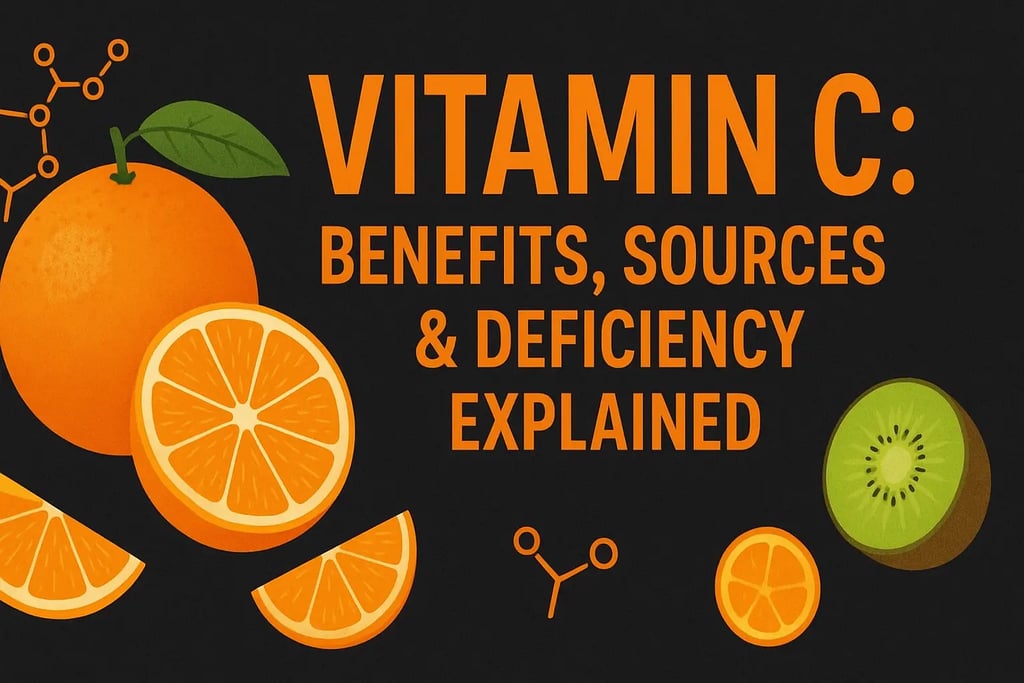Vitamin C: Benefits, Sources, Recommended Intake & Deficiency Explained
Discover the importance of Vitamin C (ascorbic acid) for your health. Learn about its benefits, top food sources, daily recommended intake, and how to prevent Vitamin C deficiency for stronger immunity and glowing skin.
EDUCATION


🧡 Introduction to Vitamin C: Importance, Benefits, and Sources
Vitamin C, scientifically known as ascorbic acid, is a water-soluble vitamin that plays a vital role in numerous bodily functions. With a molecular structure consisting of carbon, hydrogen, and oxygen (C₆H₈O₆), this powerful nutrient contributes to collagen production, immune support, and antioxidant protection. It naturally exists in several forms, including ascorbic acid, sodium ascorbate, and calcium ascorbate, all found abundantly in fruits and vegetables.
Historical Background
The importance of Vitamin C became evident in the 18th century when sailors discovered that eating citrus fruits prevented scurvy—a disease marked by fatigue, gum bleeding, and skin issues caused by Vitamin C deficiency. Since humans cannot produce this vitamin naturally, it must be obtained through diet or supplementation. This discovery firmly established Vitamin C as an essential nutrient for maintaining overall health and vitality.
Role in the Body
Vitamin C serves several crucial functions, such as:
Collagen synthesis: Supports healthy skin, bones, and connective tissues.
Antioxidant protection: Shields cells from oxidative damage caused by free radicals.
Immune defense: Enhances immune cell function, helping the body fight infections more effectively.
Adequate intake of Vitamin C, whether from food or supplements, is essential for maintaining strong immunity, youthful skin, and overall wellness.
🥝 Recommended Dietary Allowance (RDA) and Food Sources
The Recommended Dietary Allowance (RDA) for Vitamin C varies by age, gender, and life stage. Meeting these daily requirements helps prevent deficiency and supports optimal health.
Age Group Recommended Intake (mg/day)
Infants (0–6 months) 40 mg
Infants (7–12 months) 50 mg
Children (1–3 years) 15 mg
Children (4–8 years) 25 mg
Adolescents (9–13 years) 45 mg
Teens (14–18 years) 65–75 mg
Adult men 90 mg
Adult women 75 mg
Pregnant women 85 mg
Breastfeeding women 120 mg
Top Natural Sources of Vitamin C
Vitamin C is abundant in many fresh fruits and vegetables, including:
Citrus fruits: Oranges, lemons, grapefruits
Berries: Strawberries, blueberries, blackcurrants
Tropical fruits: Kiwi, papaya, pineapple, guava
Vegetables: Red and green bell peppers, broccoli, Brussels sprouts, tomatoes
💡 Tip: Vitamin C is sensitive to heat. Avoid overcooking vegetables to preserve their nutritional value. Storing produce in cool, dark places also helps maintain vitamin content.
🌿 Health Benefits of Vitamin C
Vitamin C is one of the most studied vitamins due to its wide range of health benefits and protective properties.
1. Prevents Scurvy
Deficiency of Vitamin C can lead to scurvy, characterized by fatigue, anemia, swollen gums, and poor wound healing. Regular intake of Vitamin C-rich foods can effectively prevent this condition.
2. Acts as a Powerful Antioxidant
As a natural antioxidant, Vitamin C protects the body from oxidative stress by neutralizing free radicals. This reduces the risk of chronic diseases such as heart disease, diabetes, and certain cancers.
3. Boosts Collagen Production and Wound Healing
Vitamin C is essential for collagen synthesis, a key protein that maintains skin elasticity and aids in wound repair. It helps rejuvenate skin, making it a popular ingredient in skincare products.
4. Enhances Iron Absorption
Consuming Vitamin C alongside plant-based foods boosts iron absorption, which is especially beneficial for vegetarians and individuals with iron-deficiency anemia.
5. Supports Mental Health
Emerging studies suggest that Vitamin C may help reduce stress and anxiety levels and improve mood by influencing neurotransmitter activity.
6. Strengthens the Immune System
Vitamin C promotes the production and activity of white blood cells, fortifying the body’s defense system against infections and viruses.
⚠️ Vitamin C Deficiency and Overconsumption
Vitamin C Deficiency: Symptoms and Risks
A lack of Vitamin C can lead to:
Fatigue and weakness
Dry, rough skin
Gum inflammation and bleeding
Anemia
Joint and muscle pain
Scurvy (in severe cases)
Deficiency often occurs due to poor dietary intake, smoking, or digestive disorders that affect nutrient absorption.
Excess Vitamin C: Potential Side Effects
Although Vitamin C is water-soluble and excess amounts are excreted in urine, overconsumption—typically from supplements—can cause:
Diarrhea
Nausea
Stomach cramps
Headache
The Tolerable Upper Intake Level (UL) for adults is 2,000 mg per day. It’s best to meet your Vitamin C needs through balanced nutrition rather than high-dose supplements unless prescribed by a healthcare professional.
🥗 Conclusion: The Power of Vitamin C for Better Health
Vitamin C (ascorbic acid) is more than just an immune booster—it’s a cornerstone of cellular health, skin vitality, and disease prevention. By including Vitamin C-rich foods such as citrus fruits, berries, and vegetables in your daily diet, you can support your immune system, enhance collagen production, and protect your body from oxidative stress.
Maintaining an optimal Vitamin C intake ensures you stay energized, resilient, and radiant from within—proving that this small nutrient delivers big benefits for your long-term well-being.
